Items
topic_interest is exactly
health
-
2020-03
Gathering "Essentials"
March 2020. By now we have heard all the news about how COVID-19 is spreading and made it to the United States. The lockdowns were starting. I was working in a legal marijuana dispensary. A normal weekday at 2PM is our slow period, but this was different. We saw more customers than normal since most have been excused from work to start quarantining. By now most people have hoarded supplies such as food and toilet paper. But these customers were worried about being locked down without their weed. Customers were maxing out their legal limits they could buy. Shelves once full of edibles and vapes were running low. Nobody could have guessed that recreational marijuana would be considered essential, but to a lot of people it was. And that was the beginning of working through a pandemic. -
2023-01-22
COVID Restrictions and Visiting Mom.
My mother has special needs and since 2014, lived in a townhome with three roommates, facilitated by Penn Foundation, a behavioral healthcare provider. I lived only 10 minutes away, and once a week I would visit her on my days off. I would bring fast food or pizza and we would watch movies together in her room. When the pandemic began, Penn Foundation - like most other healthcare facilities - imposed tight restrictions for the safety of those under their care. As a result, I was unable to visit my mother for half a year, and after restrictions were loosened, our visits were relegated to sitting on her front porch eating and talking. Due to a deterioration in her condition, she was moved to a nursing facility. We never got to have another movie day. The pandemic had changed the way I visit my mother forever. -
 2022-06-06
2022-06-06Arkansas Prisoners and COVID Relief Payments
This article details a court ruling that requires the Arkansas Department of Corrections to pay out over $2.5 million dollars in withheld COVID relief money from the federal government. When COVID stimulus relief checks were rolled out, any money going to those incarcerated in Arkansas was immediately confiscated by the Arkansas Department of Corrections and placed within the state prison budget. Several inmates then sued the Department of Corrections demanding the payment of their stimulus. While the Department of Corrections alleged that they were entitled to the money due to the inmates being under their jurisdiction, this ruling requires the immediate repayment of all stimulus money. This story demonstrates not only a conflict within the Arkansas prison system, but also the tremendous legal questions the pandemic opened as well as the questionable conduct spurred by government officials in response. -
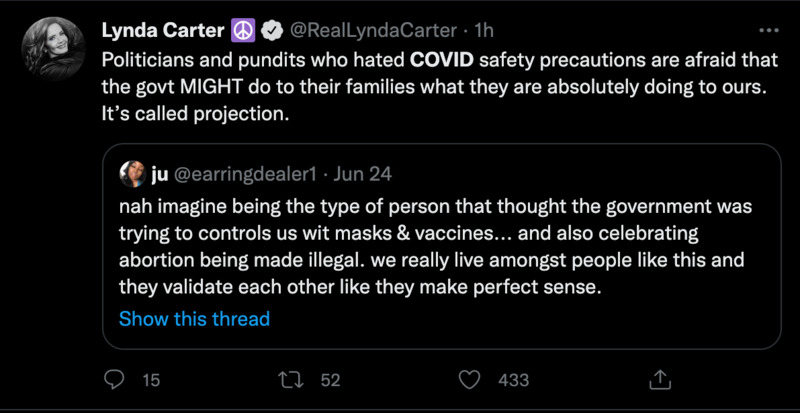 2022-06-25
2022-06-25It's called projection
This is a tweet from RealLyndaCarter. Lynda Carter is famous for her role in the Wonder Woman TV series. Here, she is expressing anger at those who hated COVID safety precautions wanting to control what people do with their health on abortion. -
 2022-06-08
2022-06-08Moderna says updated Covid-19 vaccine booster shows stronger antibody response against Omicron
This is a news story from CNN by Jamie Gumbrecht. Moderna believes that their COVID-19 booster is effective against Ominicron, and more effective compared to the normal two doses. The claim is that the booster provided a stronger antibody response than the initial two doses. -
 2022-05-15
2022-05-15The Nature of the Covid Skeptic
This is an interesting article I have found detailing 20 "facts" about the Covid-19 pandemic. This article largely attempts to refute the "overreaction" of the world when it came to the covid-19 pandemic. While criticism of conduct and policy is valuable and necessary for an open and clear discussion, attitudes of pandemic skeptics largely negate the vulnerable populations of the world and feed on the ignorance of the global population. This is one such article. 1. This article claims the lethality of covid is generally less than 1% of the population. While I seriously question that number, it still does not negate the extreme death seen by the world. The United States of America has roughly 331 million people living within their boarders. 1% of 331 million is still 3.31 million deaths. Is this a number in which it is appropriate to have an "it is what it is" attitude? Particularly when the people most impacted by the pandemic are those with health issues and the elderly? This attitude, which is shared by many skeptics borders on ageism and ableism. 2. This article claims that those most adversely impacted by covid are those over the age of 80 (78 in the US). But I ask again: is this a valid reason to not take the pandemic seriously? Are we supposed to let the elderly population simply waste away under the boot of covid? 3. This article claims that the covid-19 vaccine is ultimately ineffective in protecting against infection or transmission. The plain truth is that nothing is 100% effective. Seatbelts are not 100% effective in preventing deaths in the event of car accidents, so should we stop wearing them? Additionally, once the vaccines began rolling out, we have seen a decline in covid cases. Indeed, that is not to say vaccinated people don't get covid, I myself being one of them, but it has certainly made covid much more manageable, particularly on the already strapped healthcare industry. 4. This article claims that the vaccine can cause fatal reactions. As can the flu vaccine, or the polio vaccine, or any vaccine. It varies from person to person. 5. This article lays blame for increased mortality on the feet of covid lockdown procedure. I would simply say that correlation does not equal causation and I am certain the increased mortality rate can more accurately be attributed to the millions who have died from covid-19 across the globe. 6. This article mentions that in most cases, individuals were asymptomatic or only had mild to moderate symptoms and that obesity played a major part in whether or not symptoms were severe. While I doubt the validity of this, even so it does not negate the precautions the world took. Should asymptomatic people not take precautions and isolate? Should they be free to wander and infect those who could be vulnerable and perpetuate death? I feel this attitude, again, negates the vulnerable population. 7. This article claims that early treatment of the disease prevented hospitalizations. I feel this point negates the rapidity of covid's effect on people. Indeed, it also assumes that everyone has equal access to early-stage treatment. 8. This article claims that 10% of symptomatic people may experience long-term health related issues following covid. This appears to be about the only accurate point of this article, the only thing i question is the percentage of the population. 9. This article claims that the ability of transmission is very limited. This is very inaccurate, particularly when one looks at the extensive number of the population who received a positive test. 10. This article claims that masks had zero impact on limiting transmission. There are countless studies disproving this point. Often times this attitude is held by individuals who care only about their own comfort rather than the people around them. 11. This article claims that lockdown's were ineffective and only perpetuated economic issues across the globe. I think New Zealand is a prime example of why this is a moot point. New Zealand locked down early in the pandemic and did not have a single case of covid for nearly a year. It was only when their borders reopened that new Zealand began to experience covid. 12. This article claims that the impact of the virus on children is miniscule and that school lockdowns did nothing to help stop the spread. It is idiotic to think that children cannot contract covid. Indeed it is further selfish to not factor in teachers and staff and their health. 13. The article claims that PCR tests often returned false positives which artificially increased the number of cases. This is deeply inaccurate as there are numerous studies highlighting the effectiveness of PCR tests. 14. This article claims that contact tracing is ineffective and cites a WHO 2019 paper on influenza tracing. Contract tracing is valuable in informing the population that they have been exposed so that they may get tested and limit their contact with others to limit the spread, it is most certainly effective. As for the 2019 WHO paper on the ineffectiveness of contact tracing for the influenza: different disease, different way of managing it. 15. The article claims that vaccine passports are ineffective as the vaccine is ineffective and are used for tracking the population. Again, the vaccine has proven to be effective. And if the government wanted to track the population, it can be far more easily be done via phones and computers than via vaccinations. 16. This article claims that mutations of covid occur frequently and that new variants decline in lethality. While I agree that the virus mutates, I seriously doubt the decline in lethality. Indeed, I think because the virus can mutate so effectively, it is another justification in taking the pandemic seriously. 17. This article cites Sweden as a case where a full lockdown did not occur, a small number of deaths, and deaths being largely attributed to the elderly population. I think the primary effectiveness of Sweden this article cites is due to the Swedish taking the pandemic seriously, wearing masks, rapid vaccinations, social distancing, and not perpetuating misinformation. 18. This article claims that seasonal influenza largely disappeared during the pandemic and that covid has displaced it as the seasonal virus. Seasonal viruses aren't displaced. Indeed, the reason for the decline in flu cases is due to the population wearing masks and social distancing. Seasonal flu returned to pre-pandemic numbers in fall and winter 2021 when many of the covid protocols had been removed. 19. This article claims the media blew the pandemic out of proportion, spread fear, and distorted information. I disagree. It is the job of the media to make the population aware of global issues such as this. Indeed, the only distortion of facts that I found during the pandemic were from pandemic skeptics who were too selfish and uncomfortable to consider their fellow humans. 20. This article claims that the virus was lab-created. Whether or not the virus was lab-created is irrelevant. The point is: it exists, it is here, and it is vital that it be taken seriously. -
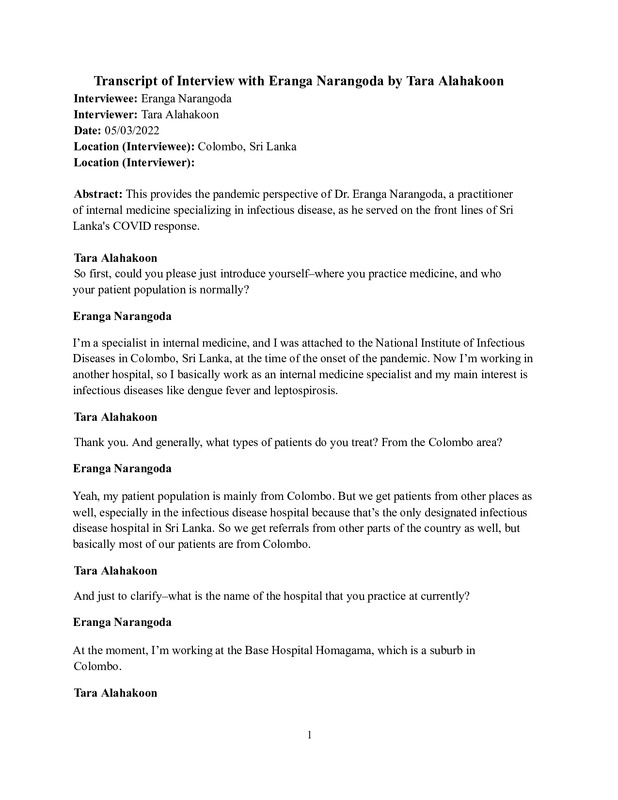 2022-05-03
2022-05-03Eranga Narangoda Oral History, 2022/05/03
It provides the pandemic perspective of Dr. Eranga Narangoda, a practitioner of internal medicine specializing in infectious disease, as he served on the front lines of Sri Lanka's COVID response. -
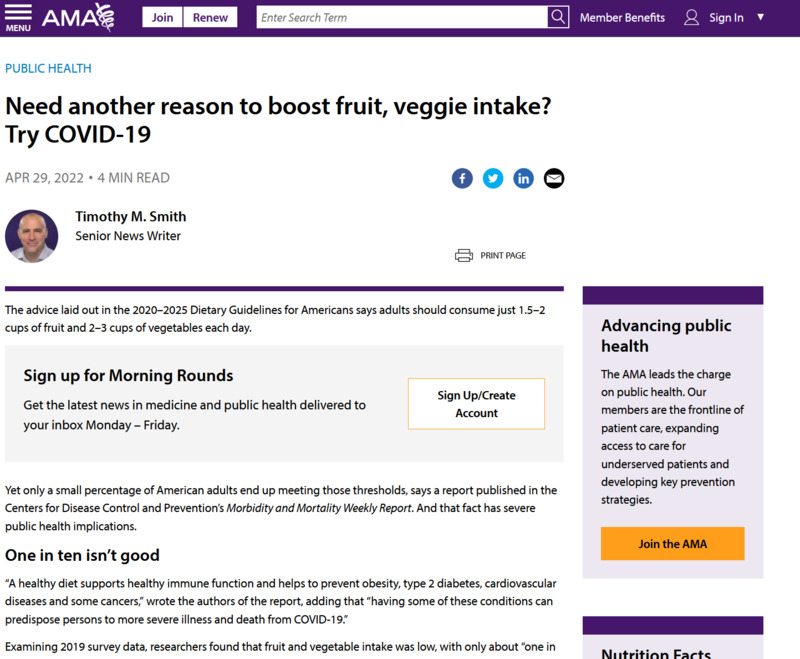 2022-04-29
2022-04-29Need another reason to boost fruit, veggie intake? Try COVID-19
This is a news story from the American Medical Association by Timothy M. Smith. Doctors mentioned in this article bring up the importance of diet and how it relates to fighting off COVID-19. According to a 2019 survey, researchers found only 1 in 10 adults meet the daily recommended intake of fruit and vegetables. There is a racial disparity as well. The researchers also noted that meeting vegetable intake recommendations was highest among those 51 or older. There were also differences in vegetable intake between groups defined by income level and race. While 12.2% of adults in the highest-income households got enough veggies, only 7.7% of those living in middle-income households did. Meanwhile, 6.9% of Black adults met vegetable intake recommendations, compared with 10.1% of white adults. Other barriers in getting the daily recommended intake have class issues, where some groups are more likely to have access to fresh food than other groups. “Perceived barriers to fruit and vegetable consumption include cost, as well as limited availability and access,” the report notes, adding that “for some persons, such barriers might have worsened during the COVID-19 pandemic related to economic and supply chain disruptions that could further limit ability to access healthier foods.” Dr. Kirley said she hopes the pandemic “will draw attention to this longstanding problem and that we’ll start to see more investment in innovative solutions to promote health through better nutrition.” With these things in mind, it demonstrates the barriers some people might have in fighting off COVID. -
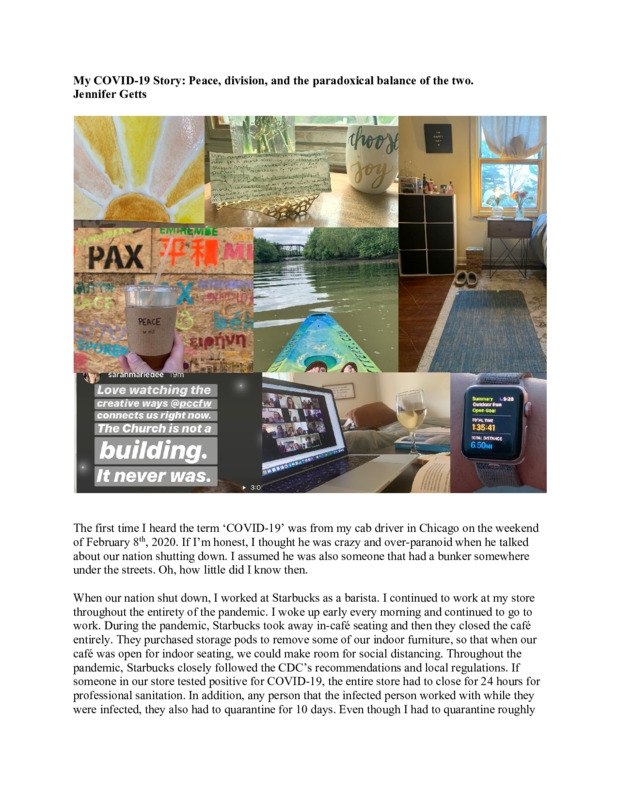 2022-04-29
2022-04-29My COVID-19 Story: Peace, division, and the paradoxical balance of the two.
The COVID-19 pandemic is largely associated with grief, pain, brokenness, division, and death. While that is true, it can also be associated with peace, quietness, solitude, growth, love, and birth. In my story, I try to strike the balance and prove that it is a paradoxical balance that can be weighed evenly. -
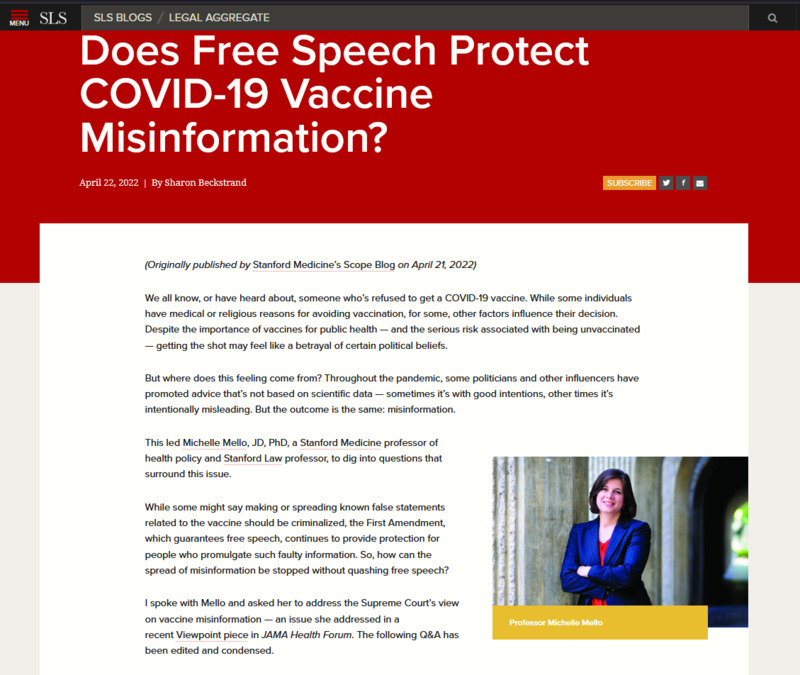 2022-04-21
2022-04-21Does Free Speech Protect COVID-19 Vaccine Misinformation?
This is a story from Standford Medicine's Scope Blog by Sharon Beckstrand. This is an opinion piece on free speech and misinformation as it relates to COVID-19. Beckstrand goes over some of the reasoning some might resist getting vaccinated, such as political beliefs. Some of these beliefs can come from well-intentioned individuals thinking they are spreading good information, or from intentionally misleading sources. Both of these examples are classified under misinformation. The author of this asks: how can the spread of misinformation be stopped without quashing free speech? To get an idea on how the United States approaches this with the First Amendment is though Supreme Court cases. The Supreme Court has upheld that false statements are still protected under free speech. A 2012 case of United States vs. Alvarez struck down a law that made it a criminal offense to lie about receiving military medals, as a false statement is still protected under the First Amendment. Other types of speech are not protected, such as: lying in court, making false statements to the government, impersonating a government official, and defaming someone. Beckstrand lays out some of the dangers that can come from the government trying to police false claims. One thing she asks people to consider is that a scientific statement claimed as false today could be considered verifiable at a different time, especially if it is something that has not been studied yet. Additionally, many do not trust the government to not abuse power when deciding what is misinformation. The article ends by saying that if something becomes politicized, they are more likely to view messages from groups they don't identify with as suspicious, regardless of how much evidence there is to back it up. At the end, Beckstrand closes with saying that if we cannot make sound decisions on how we interact with information, we can't make sound decisions about health. -
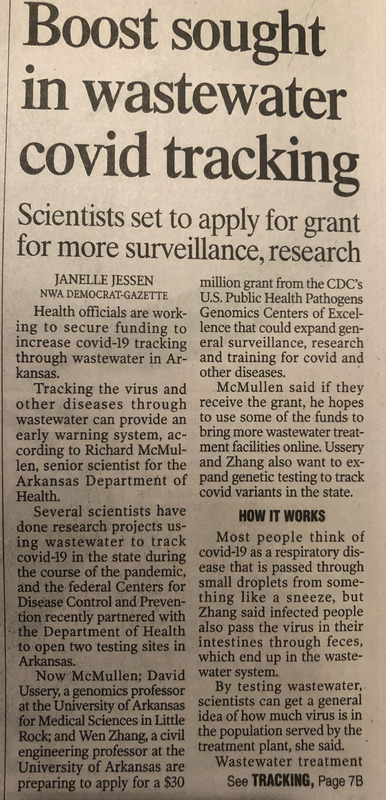 2022-04-10
2022-04-10Boost sought in wastewater covid tracking
This is a news article detailing the work of health officials and scientists and a new program of tracking COVID in wastewater through a program at the University of Arkansas. The Arkansas Department of Health hopes this new program will allow scientists and health officials to receive an early warning about a potential surge in the spread of COVID and take appropriate measures to minimize the potential damage. If successful, the University and the Arkansas Department of Health hope to apply for a $30 million dollar grant from the CDC to implement the process across the country and perform more research. The basic premise is to collect a sample of wastewater and test for COVID-19 and thereby generally derive if the community is increasing or decreasing in cases. While the program cannot give a specific number of afflicted individuals, it is suggested that understanding COVID in wastewater will give health officials a better understanding of those who test at home and therefore do not report on state-wide numbers. This article is fascinating, I think, because it demonstrates a rapid growth in scientific ideas to combat the pandemic since the dawn of COVID in America. Indeed, COVID has permeated every aspect of our lives, so it is only natural to derive a solution from even the most mundane aspects of humanity. It would seem impossible to gain a greater understanding of COVID from something such as wastewater, but the pervasiveness of COVID has encouraged study such as this. I think the ultimate mission of this program is valuable. When I had COVID at the start of February, I took an at home test and therefore I was not reported as a number in the statewide totals. This article really made me think about whether or not we as a society really know how many people are afflicted with COVID and just how serious the pandemic is or not. This article was published in the Northwest Arkansas Democrat Gazette. -
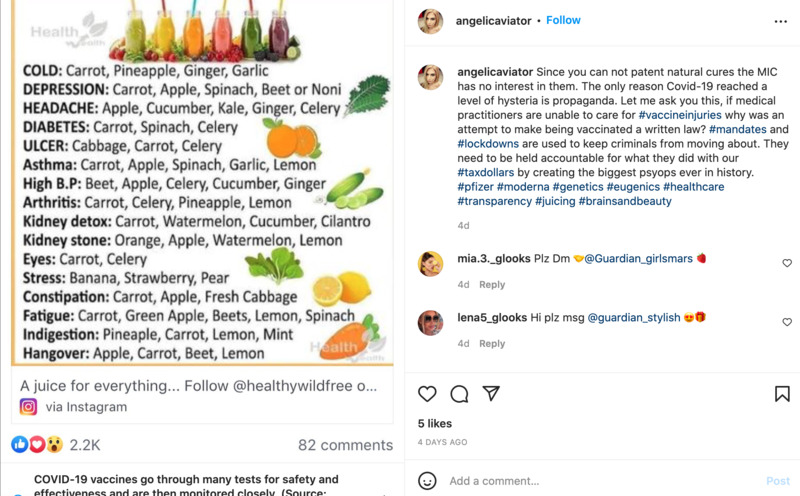 2022-04-18
2022-04-18Natural Medicine
This is an Instagram post by angelicaviator. This person suggests that more natural cures can help with COVID symptoms. Since natural cures don't make profit for the healthcare industry, this is why this person thinks that they are often overlooked. The picture that goes with this has types of juicing suggestions on what goes best against a certain ailment. -
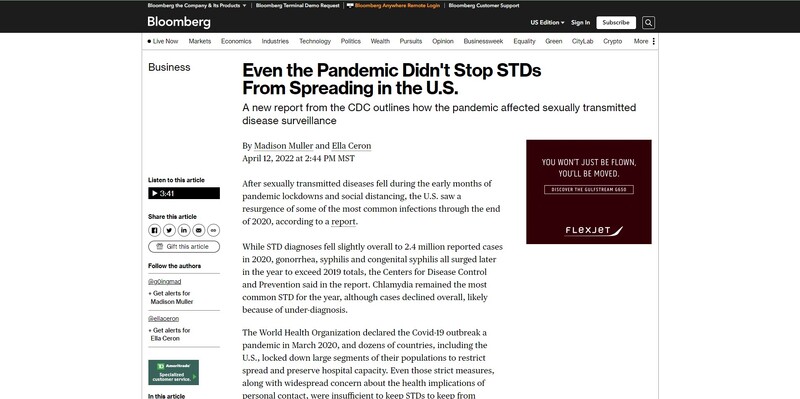 2022-04-12
2022-04-12Even the Pandemic Didn't Stop STDs From Spreading in the U.S.
This is a news story from Bloomberg by Madison Muller and Ella Ceron. According to recent reports, the overall amount of STDs went down with the lockdowns in early 2020, but then started to rise again near the end of 2020. Gonorrhea, syphilis and congenital syphilis all surged later in the year to exceed 2019 totals, the Centers for Disease Control and Prevention said in the report. Chlamydia remained the most common STD for the year, although cases declined overall, likely because of under-diagnosis. Possible reason why the numbers may be decreased for the beginning of 2020 might not be because of the lockdowns entirely. Some people in 2020 skipped doctor's appointments where they could have gotten diagnosed, in addition to resources being low during the height of the pandemic. Other trends included in this study are the rates of health insurance among certain demographics. Black people, in addition to LGBTQ people, are shown to have lower rates of having health insurance. -
 2022-04-15
2022-04-15Caring for my husband
This is a Twitter update from Shelby_Thom. She says that her husband became a long-haul COVID patient. He got vestibular neuritis, which causes severe dizziness. He is unable to work or drive. He was a healthy 34-year-old too prior to this, but now hits his head a few days after recovery. -
2021-04-01
My Awakening
For me, the start of covid began in the middle of my freshman year of college. Just like everyone else, I took my precautions and even got the vaccine. Around April of 2021, being isolated and forced to accompany myself. I had felt like I was in a transitioning stage of life, I felt the need to grow and do more things for myself. I have completely changed my life around, a full 360. I broke up with my ex-boyfriend because I could see our differences in emotional intelligence and maturity. That was my final straw that made me break out of my cocoon. I had deleted some social media that I felt was a major distraction and a road block for me to grow more confidently. I began focusing more on my school work and connecting with new people. I even got a new serving job and was making good money for being a college kid. I learned to enjoy the things I had forgotten about, such as painting and singing. I learned to connect to myself. This pandemic has opened me up to new opportunities and has provided me with a few life lessons. Life is more than simply succeeding to be at the top. Don’t forget to take a breather and surrender to what the moment is teaching you or blessing you with. -
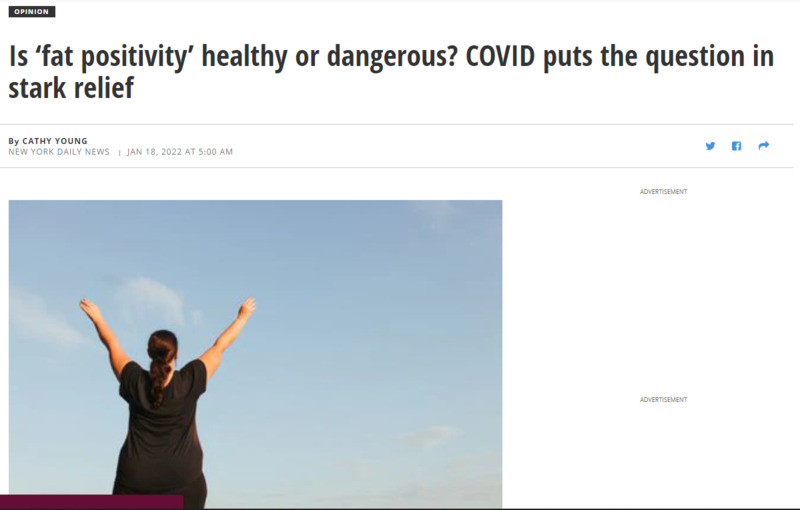 2022-01-18
2022-01-18Is ‘fat positivity’ healthy or dangerous? COVID puts the question in stark relief
This is a news story from New York Daily News by Cathy Young. This is an opinion piece questioning what body positive activists have been claiming about obesity and COVID, with many claiming weight has little to no effect on recovering from COVID. Quoting the CDC, Young says that obesity puts people at greater risk of dying from COVID than those of normal weight. Other parts of this opinion piece deal with the language surrounding the body positive movement, and how there is no distinction made between listening to medical advice and getting harassed. The author says that this is a major issue because it makes it so people reject sound medical advice at the expense of their own health. She says that while outright harassment is cruel, genuine concern and wanting people to improve their well-being is not. There is also criticism towards feminist writers in this article, such as Kate Manne, a philosophy professor from Cornell University, that claims all dieting is "morally bad." Young acknowledges that dieting can be unhealthy, but it is not unhealthy in and of itself. She thinks that if you have realistic goals, maintaining a healthy weight is not impossible. At the end, Young explains that this body positivity movement is destructive towards people, and that those struggling with weight issues should be met with compassion, but not "acceptance." This essay shows some of the social impacts of COVID. With some people reporting weight gain during lockdowns, it is easy to see why body positivity would be encouraged as a result. Though, since obesity puts one at higher risk for more complications with COVID, or any other disease for that matter, it should not be encouraged, in my own opinion. It is one thing to be shaped differently, it is quite another to accept being obese when it poses many health risks. -
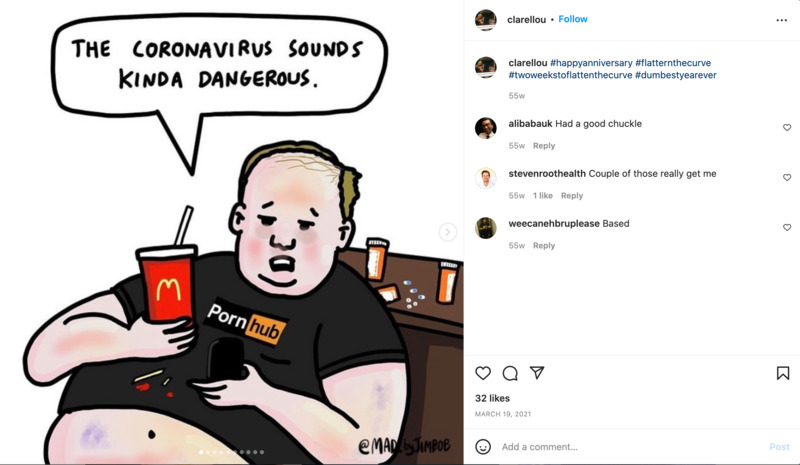 2021-03-19
2021-03-19The Coronavirus Sounds Kinda Dangerous
This is an Instagram post by clarellou. The post is of a comic showing a man with unhealthy habits calling the coronavirus dangerous. This is supposed to be criticism of people not taking care of their own health, while being fearful of something less deadly than being obese or a drug abuser. -
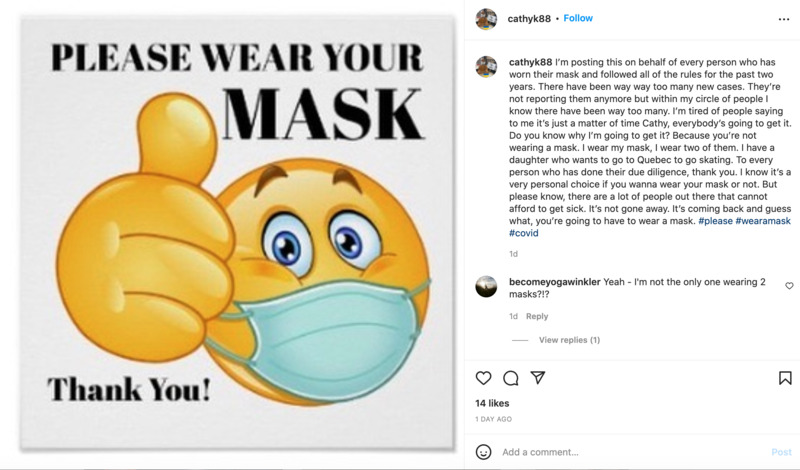 2022-04-06
2022-04-06Please Wear Your Mask
This is an Instagram post by cathyk88. This user is posting on behalf of everyone that has followed the rules regarding masking these past two years. This user says that while new cases are not being reported by the media, this user is still keeping up with them. They say at the end that it is a personal choice of whether to wear a mask or not, there are a lot of people that cannot afford to get sick. At the end, they conclude that COVID is making a comeback and that people should mask up more. -
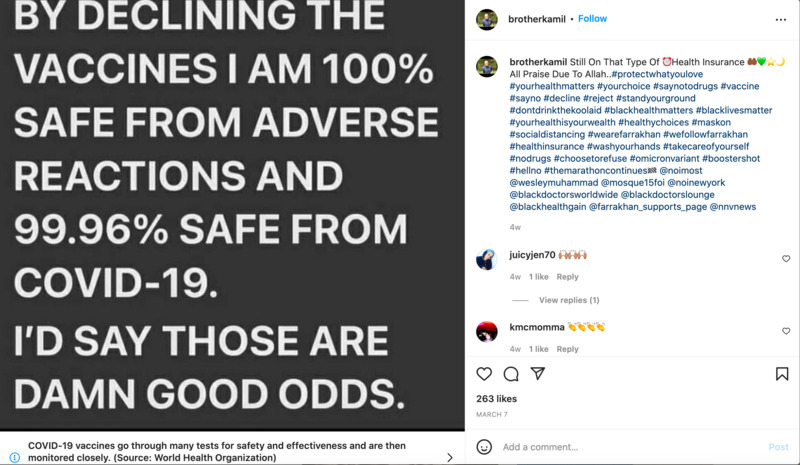 2022-03-07
2022-03-07Decline the Vaccine
This is an Instagram post from brotherkamil. This user is posting their skepticism surrounding the vaccine, believing that it will cause ill health effects. By abstaining from the vaccine, the user says that they are 100% safe from averse reactions. -
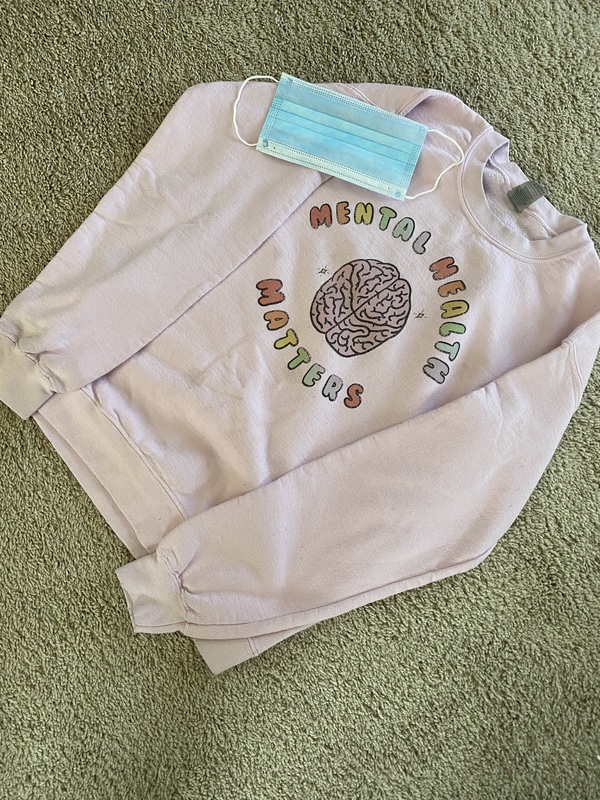 2022-03-26
2022-03-26Coping with the Pandemic--A Personal Look at Mental Health and COVID-19
According to the Center of Disease Control, in June of 2022, US adults reported considerably elevated adverse mental health conditions associated with COVID-19. Out of a survey they did on 5,412 people, 40.9 percent of respondents reported at least one adverse mental or behavioral health conditions, including symptoms of anxiety and depressive disorder which were around 31 percent. One of the causes of this is due to increase sedentary behaviors and low levels of physical activity due to quarantines and lack of business operation. Over the past two years, government mandated quarantine, work from home, and online schooling has caused me to stay at home for longer periods of time than what I use to. Because of this sedentary behavior, I had dealt with the negative effects of isolation, stress, and anxiety on both my mental and physical health. According to the World Health Organization, 150 minutes of moderate exercise or physical activity is usually recommended per week, however, with working a full-time job and being in school, the question that remains is how that is possible? I have learned to accommodate these physical needs indoors, by taking active breaks during the day and exercising at home. While this does not necessarily help with isolation and loneliness sometimes, I have learned to take these matters one day at a time and not shun myself for feelings them. CDC argues that from a recent comprehensive review that the impact of COVID-19 on mental health particularly seems to affect more young women disproportionally than any other group. Therefore, I recommend any young adult or women facing severe mental health to take advantage of online support or mental health services through telehealth such as ZocDoc. It is important to highlight COVID-19's impact on mental health in the United States and my personal life because it shows how the pandemic changed the means and the ways we received mental health services in the past. As the pandemic ventures on, people like myself will continue to have to find ways to cope and receive services for our problems. Thanks to the pandemic, much of our mental health problems have come more to the forefront due to us having ample amounts of time now to navigate and deal these issues unlike never before. -
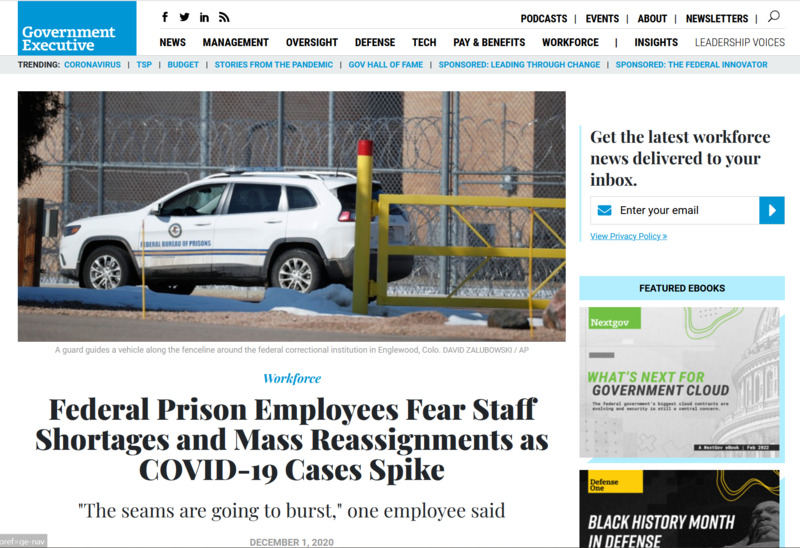 2022-03-26
2022-03-26Locked In and Locked Down: Surviving COVID-19 in FCI Edgefield BOP
The COVID-19 crisis has impacted mass incarcerated facilities at an exceeding rate, exacerbating existing staffing shortage and leaving those housed in large numbers increasingly vulnerable to COVID-19. The Federal Correctional Institution in Edgefield, South Carolina is no exception to this hardship. FCI Edgefield has be forced to expand its use of a practice called "augmentation" or allowing those in non-correctional roles at the prison to work in correctional officer roles. This is because staff members are getting sick an exceedingly high rate, causing some staff to have quarantine for several days while others have chosen to retire early out of the fear of high exposure and incentives losing way due to the crisis. Since the pandemic has taken off, only a small number of inmates have died from COVID-19, about 50 in total. Yet, due to less experienced staff on site due to shortages, one inmate died due to undermined symptoms on January 27, 2021. Overall, stories like these are important because they show how state officials, lawmakers, and policymakers have made little strides in reducing and slowing down the spread of the coronavirus in state and national prison systems. People like my mother, who works at FCI Edgefield, have preexisting medical conditions that put them at a heightened risk for complications if they were to catch COVID-19. Thus, we should make aware that these state officials have waited too long to make strides towards reducing the prison population, routinely rotating staff, and increasing social distance measures in the jail populations. As the pandemic wears on, much is still needed to be done in prioritizing staff and prison populations for vaccination matters. While this idea has generated some wide societal debate, I find it hard to argue that people who work and live in correctional facilities are at a major disadvantage in this crisis. Therefore, it is only fair to consider these high-risk groups first when prioritizing phases and measures of the vaccines and health and well-being. -
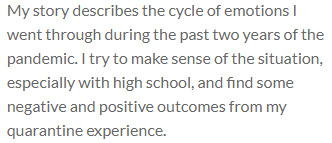 2022-02-07T10:00:00
2022-02-07T10:00:00Taking Covid-19 Step by Step
My story describes the cycle of emotions I went through during the past two years of the pandemic. I try to make sense of the situation, especially with high school, and find some negative and positive outcomes from my quarantine experience. -
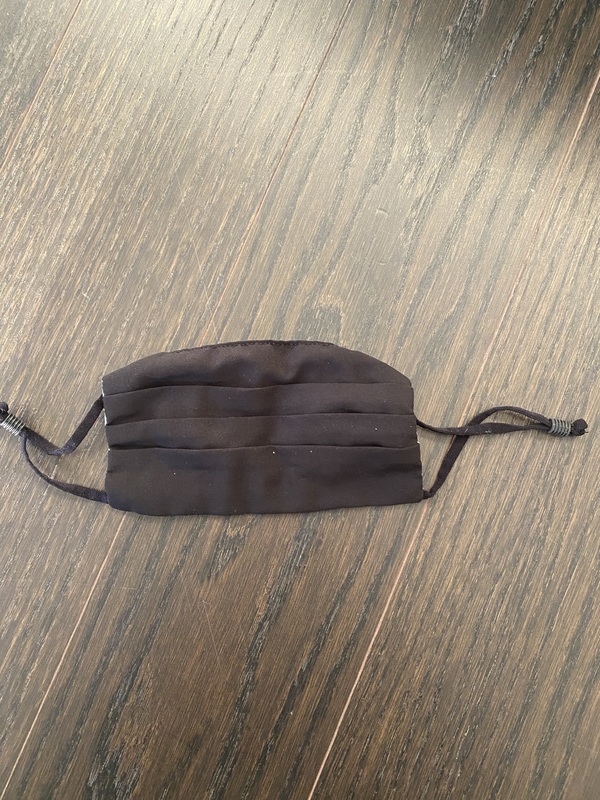 2020-04-09
2020-04-09One of my first disposable masks
I wore this mask many times (it has of course also been washed many times) and the way it is in such good condition reflects on how during this hard year of 2020, many things have been thrown at us and the world has also changed in many ways, but nevertheless, we all got through it. -
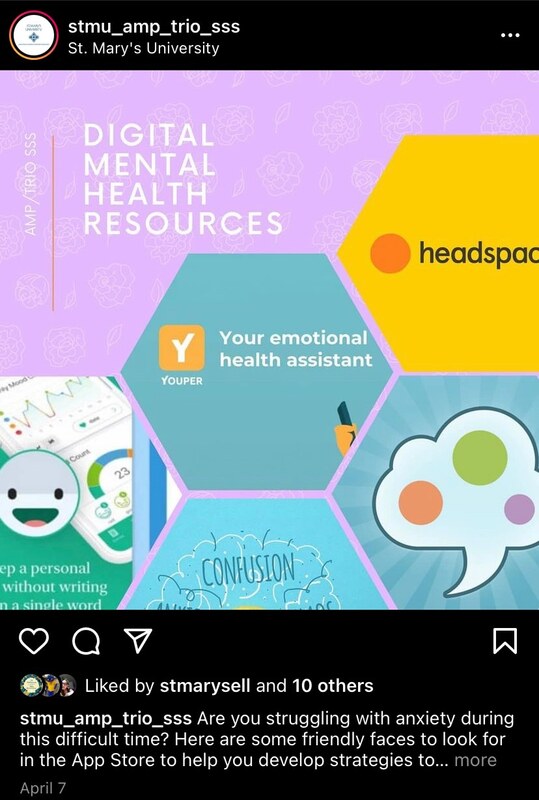 2021-04-07
2021-04-07The Mental Pandemic
The pandemic was difficult in more ways than one. Health and safety were covered by all news stations, but the deeper hidden pandemic was the struggle of mental health and staying mentally healthy during isolation and lockdown. These screenshots showcase that mental health was an important topic that people were struggling with but the university tried to give help to students and staff that were struggling. This screenshot is important to me because they were resources I utilized that helped me mentally go through the pandemic and I believe deserve more attention. -
 2017-03-19
2017-03-19Sweet Smell of Peroxide
You could not walk into any establishment last year without the delightful smell of disinfectant and cleaning products entering your nostrils. When I worked at Aldi and Lowes last year, the cleaning products sold out in two weeks at the start of the pandemic. The lack of these products became so bad that stores across the country had to regulate home many products consumers could buy at a time. The regulation for disinfecting the stores I worked at were in 30 minute intervals. Shopping carts, door knobs, flat surfaces, and bathrooms were all expected to be disinfected on a continuous loop. Although I agreed that these procedures were necessary, they products were used eventually caused me to develop anosmia. Today, my current job still has a huge supply of disinfectant wipes stocked up underneath the kitchen counter. This sight bewilders me because I never would have thought two years ago that having Lysol and wipes on hand would be seen as necessary now in our present future. To this day, I still cannot smell disinfectants, perfumes, and other fragrances to their entirety. I honestly see this as a blessing and curse due to past experiences with both strong aromas and odors. -
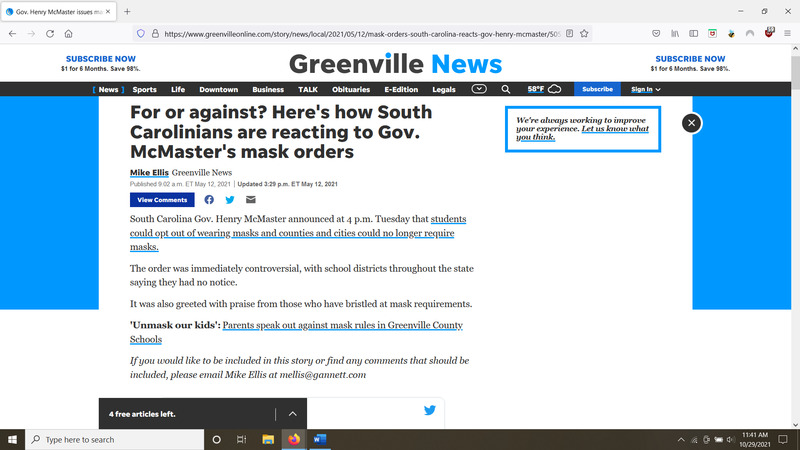 2021-03-13
2021-03-13On the Fence
South Carolina legislation and its residents have always been on the fence about COVID but when senator Lindsey Graham caught it back in March of this year, reality started to settle in. This was a wake up call to southerns and South Carolinians alike to start taking COVID mandates more seriously. I empathized with Graham but also was somewhat grateful that his sickness would be a lesson to others. -
2020-03-28
Five years took for granted
Five. This was the number of years that I was able to spend with one of the most important people in my life, my uncle. From the moment I moved here in Brooklyn, he was one of the few that made me feel welcomed. He loved me, took care of me and supported me as if we'd know each other our entire lives. He stood as a second father figure to me, and he truly always managed to put a smile on everyone's face. But, on March 28th, 2020 COVID-19 got the best of him and unfortunately passed away. I was devastated and so heartbroken. Despite how painful his death was, it taught me many valuable lessons. But, I believe the most important one is to not take each day we get to spend with our families for granted. -
 2020-03-01
2020-03-01Increase of Outdoor Participants since the Pandemic's Onset
Since the start of the pandemic, I've begun to both run and hike when I get the chance. After talking with people who have done the same since before the pandemic, they've noted how there is absolutely an increase of people outdoors. For me, it's a great way to escape and improve mental health, and I think it's worth noting how many are trying to find ways to improve themselves and keep going through various ways during such a tough time. -
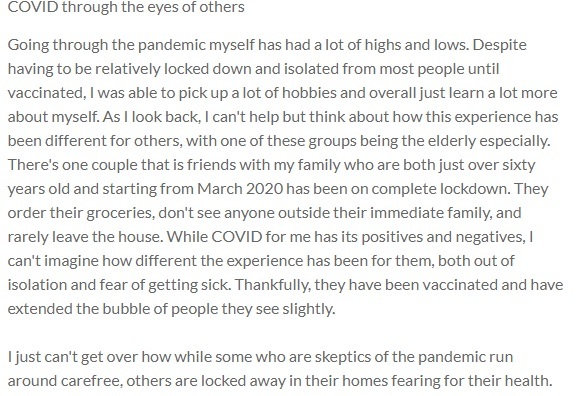 2020-03-01
2020-03-01COVID through the eyes of others
Going through the pandemic myself has had a lot of highs and lows. Despite having to be relatively locked down and isolated from most people until vaccinated, I was able to pick up a lot of hobbies and overall just learn a lot more about myself. As I look back, I can't help but think about how this experience has been different for others, with one of these groups being the elderly especially. There's one couple that is friends with my family who are both just over sixty years old and starting from March 2020 has been on complete lockdown. They order their groceries, don't see anyone outside their immediate family, and rarely leave the house. While COVID for me has its positives and negatives, I can't imagine how different the experience has been for them, both out of isolation and fear of getting sick. Thankfully, they have been vaccinated and have extended the bubble of people they see slightly. I just can't get over how while some who are skeptics of the pandemic run around carefree, others are locked away in their homes fearing for their health. -
-0021-08-31
Anger, Frustration, and Hope
In December of 2020 my family went to Florida to pick up our eldest daughter. All but one of us tried to be diligent in wearing masks, distancing and reducing the risks as much as possible. Yet despite that a week later, on Christmas day, my husband started feeling tired and slept most of the day. That was as bad as it got for him. The following Monday we were all feeling ill and I was in the car line being tested, it was positive. On New Years Eve I went to the hospital by ambulance with my oxygen levels in the low 80's. I couldn't say goodbye to my four kids (two in college and two in high school) because I didn't want it to be a final goodbye. I spent ten days in the hospital. Thankfully the constant oxygen, medications and antibody therapies did their job and I didn't need to be intubated. However, the virus wreaked havok on my body. My eyes hurt and would not focus, my body and joints ached, my focus and cognitive function was shot. I struggled to find balance and felt like I weighted a thousand pounds (heavy, oppressive weight). I struggled for breath yet the oxygen took its toll as well leaving painful ulcers in my nasal cavity and after two months of oxygen, a hole in my sceptum. My sugar levels were dangerously high and difficult to regulate and I shifted from a daily pill to needing four shots of insulin a day. It has been eight months and my body still has not returned to any sense of normalcy. I still struggle with controlling my sugar levels. My cognitive recovery has been slow and things that would take an hour in the past now take three or four (like reading and analysing text). I struggle with exercise as my lungs still have not healed. Even walking up a flight of stairs leaves me in tears as I struggle for breath and feel like I'm drowning. I have to divy up my workable time because my body will only do so much before it gives out. I struggle with odd symptoms. I struggle to sleep and struggle to stay awake. I also struggle with depression and self worth. I now feel like a burden. No, I am not suicidal, but I would be lying if I didn't admit that there are so many times when I feel like my family (my spouse in truth), would be better off without this new version of me. They don't understand why I can't do what I did before and doesn't believe in COVID or vaccines or wearing a mask. It's all media propoganda meant to promote a socialist agenda. I only got this sick because I was overweight and had diabetes before COVID. It cuts like a knife when you hear things like that and when it feels like someone doesn't care enough to want to do what they can to protect the ones they say they love. Maybe that's my biggest takeaway from all of this. It's redefining who I am and how I percieve the people around me. The people I thought loved me the most, who I loved the most. It's opened my eyes to the divisions and the anger that run deeper than just the pandemic. But I've also seen the depth of human compassion and love. Friends who made sure my kids had food and whatever else they needed when they were quarantined. The staff at the hospital who ran themselves ragged caring for patients. My nurse practitioner who has been on this journey with me the past eight months and worked diligently to help me recover. The students I've worked with who adapted and were more accepting and flexible in all of this mess than their parents, as they learned new ways of learning. It gives me hope that while there is bad in this world, there is so much good. -
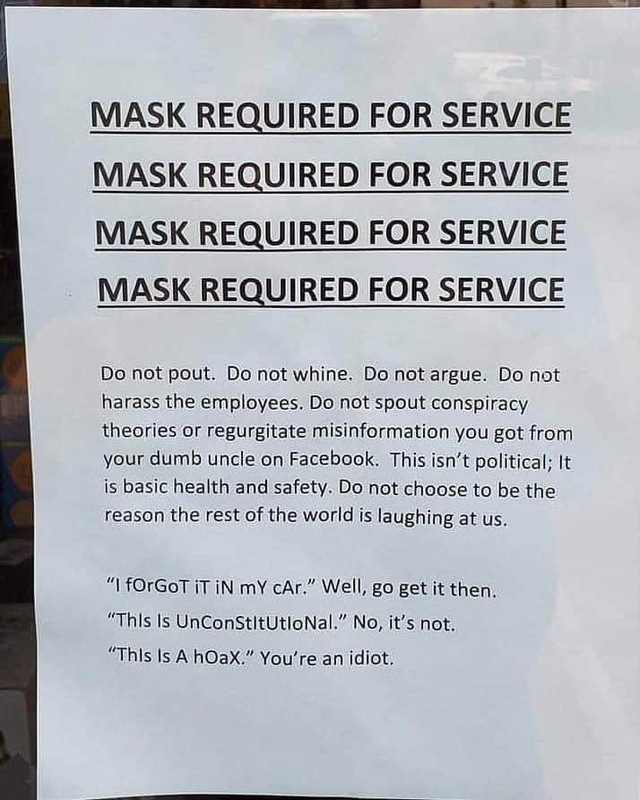 2021-08-10
2021-08-10Mask Required for Service
Signs have become so common these days that I often catch myself making sure if a business requires masks or prefers customers not to (I've seen those too). I take an extra moment to enjoy personalized signs like these. I love the solutions to the dumb questions at the end. If everyone would just wear a mask I wonder how low our numbers would be. My favorite part is the last sentence of the paragraph "Do not choose to be the reason the rest of the world is laughing at us." -
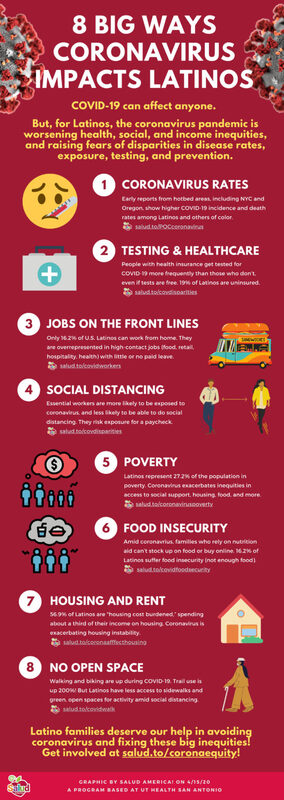 2020-04-16
2020-04-16Infographic: 8 Big Ways Coronavirus Impacts Latinos
This infographic and the accompanying articles discuss the disproportionate impact that coronavirus has on Latino communities. -
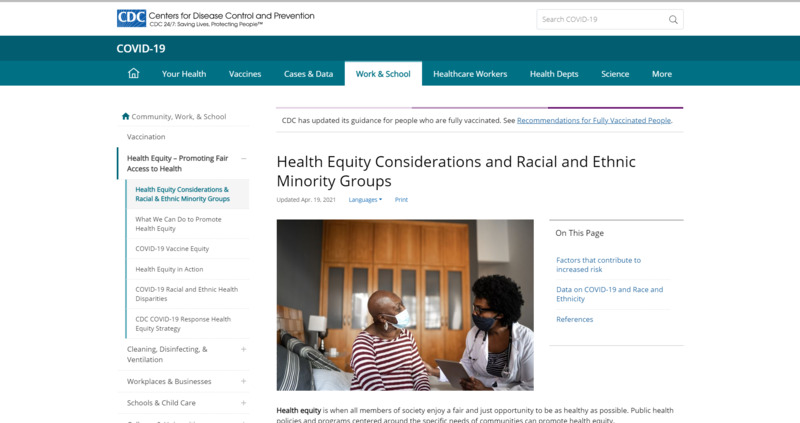 2021-04-19
2021-04-19Health Equity Considerations and Racial and Ethnic Minority Groups
The pandemic has brought the issue of health inequity in the United States, based on factors such as race and ethnicity, to the forefront. Racial and ethnic minority populations make up a disproportionate essential workers. Poverty restricts access to health care for many individuals. The country must address these issues of health equity and social justice now and continue to address it t ensure the health and safety of all those living in the United States. The website provides references, information, and data on the link between ethnicity and race and COVID-19. -
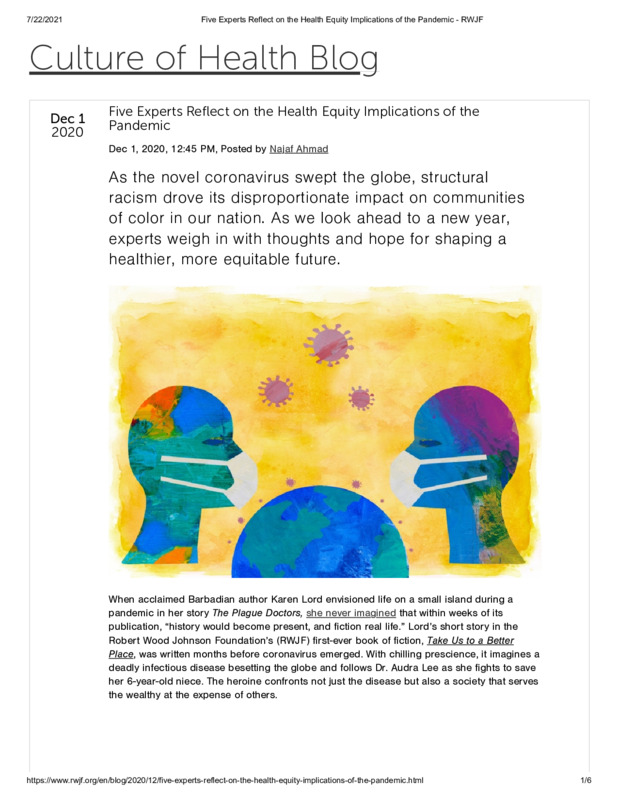 2020-12-01
2020-12-01Five Experts Reflect on the Health Equity Implications of the Pandemic
The Robert Wood Johnson Foundation Health Blog published this article which contains the words of 5 different experts on health inequity during the pandemic. -
 2021-07-14
2021-07-14California woman first to face federal charges over fake COVID immunizations, vaccination cards
A homeopathic doctor in California became the first person in the United States to face federal charges over fake COVID-19 immunizations and falsified coronavirus vaccine cards. Juli A. Mazi, 41, of Napa was arrested Wednesday and charged with one count of wire fraud and one count of false statements related to health care matters, the Department of Justice said in a press release. "This defendant allegedly defrauded and endangered the public by preying on fears and spreading misinformation about FDA-authorized vaccinations, while also peddling fake treatments that put people’s lives at risk. Even worse, the defendant allegedly created counterfeit COVID-19 vaccination cards and instructed her customers to falsely mark that they had received a vaccine, allowing them to circumvent efforts to contain the spread of the disease," said Deputy Attorney General Lisa O. Monaco. -
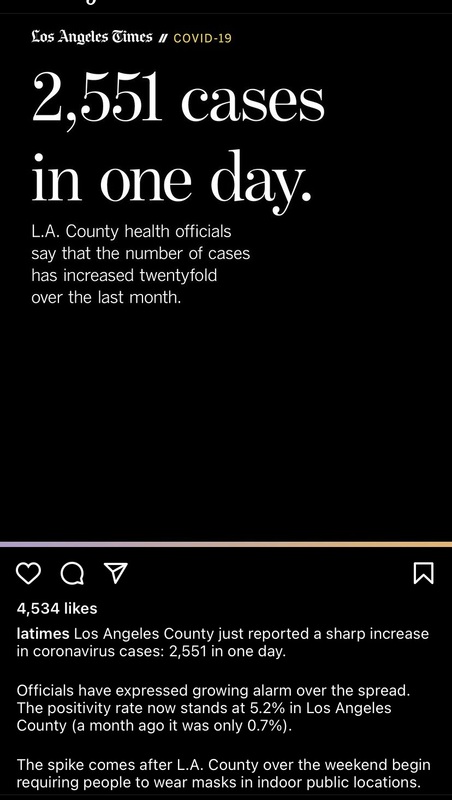 2021-07-21
2021-07-212,551 cases in one day.
The Los Angeles Times reports "L.A County health officials say the number of cases has increased twentyfold over the last month." Clear evidence that we are not out of the woods, COVID is still around and people are still dying. I wonder if anyone is still paying attention. -
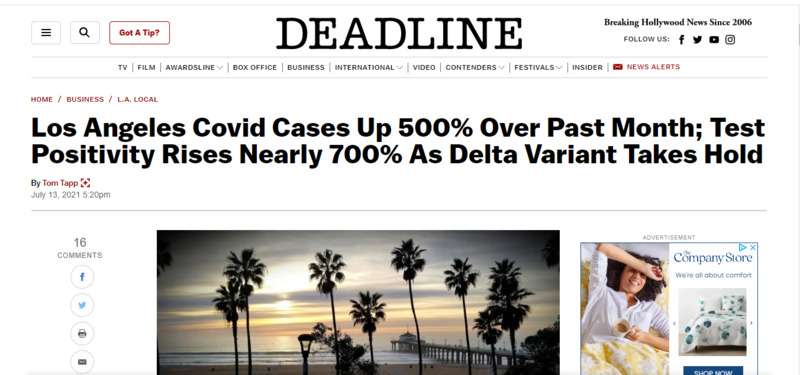 2021-07-14
2021-07-14Los Angeles Covid Cases Up 500% Over Past Month; Test Positivity Rises Nearly 700% As Delta Variant Takes Hold
The Los Angeles County Department of Public Health confirmed 1,103 new cases of Covid-19 on Tuesday. It’s the fifth consecutive day cases have been over 1,000. For perspective, one month ago, the 5-day average of cases was 201. Today the 5-day average is 1,095; this is an increase of more than 500% in just one month. That increase has come even as testing has dropped precipitously, which means the actual rise of infections is likely much greater as there are fewer chances to identify cases. -
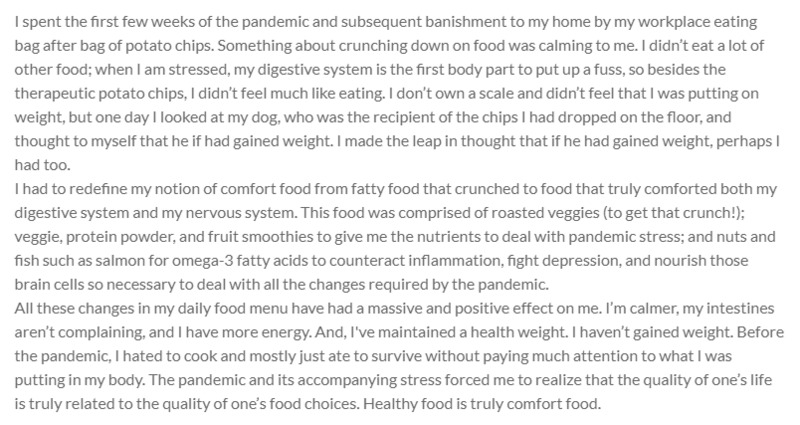 2021-06-20
2021-06-20Comfort Food Redefined
I spent the first few weeks of the pandemic and subsequent banishment to my home by my workplace eating bag after bag of potato chips. Something about crunching down on food was calming to me. I didn’t eat a lot of other food; when I am stressed, my digestive system is the first body part to put up a fuss, so besides the therapeutic potato chips, I didn’t feel much like eating. I don’t own a scale and didn’t feel that I was putting on weight, but one day I looked at my dog, who was the recipient of the chips I had dropped on the floor, and thought to myself that he if had gained weight. I made the leap in thought that if he had gained weight, perhaps I had too. I had to redefine my notion of comfort food from fatty food that crunched to food that truly comforted both my digestive system and my nervous system. This food was comprised of roasted veggies (to get that crunch!); veggie, protein powder, and fruit smoothies to give me the nutrients to deal with pandemic stress; and nuts and fish such as salmon for omega-3 fatty acids to counteract inflammation, fight depression, and nourish those brain cells so necessary to deal with all the changes required by the pandemic. All these changes in my daily food menu have had a massive and positive effect on me. I’m calmer, my intestines aren’t complaining, and I have more energy. And, I've maintained a health weight. I haven’t gained weight. Before the pandemic, I hated to cook and mostly just ate to survive without paying much attention to what I was putting in my body. The pandemic and its accompanying stress forced me to realize that the quality of one’s life is truly related to the quality of one’s food choices. Healthy food is truly comfort food. -
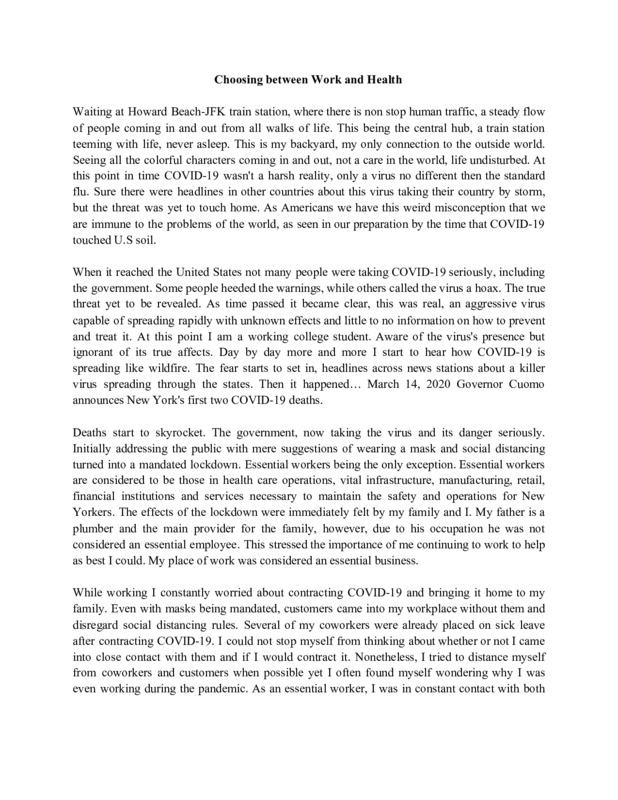 2021-03-26
2021-03-26Choosing between Work and Health
This short piece shares the struggles and experiences of choosing between working as an essential worker and worrying about my family's health during the peak of the pandemic. -
 2021-03-29
2021-03-29Healthcare Workers and the COVID-19 Pandemic
The website designed was chosen to focus on the topic of healthcare workers and their role during the ongoing COVID-19 pandemic. It showcases multiple elements of media from pictures, videos, social media posts and other engagements that compile information and stories about frontline healthcare workers that are putting their lives on the line to save people. It is necessary that the general population has an understanding of what our healthcare workers are going through during such an unprecedented time. It was important for me to show this side of healthcare workers because they are the heroes amongst our society, and we all talk about fictional heroes or figures and whatnot, but we need to appreciate those that are fighting and sacrificing themselves, for the betterment of our health. This archive project was for university course that I took this semester, and it required extensive research, but additional to that I also had the opportunity to reach out to healthcare workers and get their stories, combined with the many stories that are shared online by them, and compiled, they have helped in constructing this body of a work which I was fortunate enough to create. A large gratitude to them because without our healthcare workers, there would be no health in our societies. -
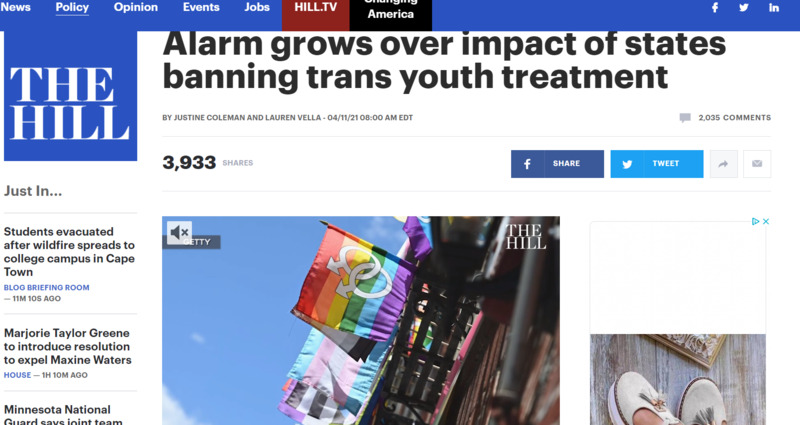 2021-04-11
2021-04-11Alarm grows over impact of states banning trans youth treatment
Medical experts and LGBT advocates are sounding the alarm over the physical and mental health risks to the transgender community after at least 19 state legislatures, including Arkansas, have proposed or passed bills seeking to ban trans youth treatment. Proponents of the bills have argued that the legislation is in place to protect children from making irreversible decisions about their bodies. But earlier this week, doctors and LGBT organizations defended treatments such as puberty blockers and hormone therapy, and warned about a potential increased suicide rate among trans youth if such legislation is enacted. -
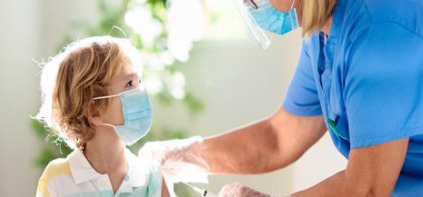 2021-04-13
2021-04-13How does the pandemic affect children?
With vaccines already approved for ages of 16, still clinical trials need to be completed for children younger than 16. There is more thought put into children's vaccine as their body does not react to things the same way that grown adults do. By the looks of statistics, it can be said that the vaccines will be available for children before the start of the 2021 - 2022 school year. This means children will be able to get the vacancies and start living more socially involved lives as it is important for them during these stages of development. Though the vaccine will not be required, it is suggested and each state will make its own laws on what type of rules they want to set. On the bright sight, the vaccine is the best hope to end the pandemic and allow children to start enjoying their lives like before again, it will help cut down children's obesity rates and boost mental health. -
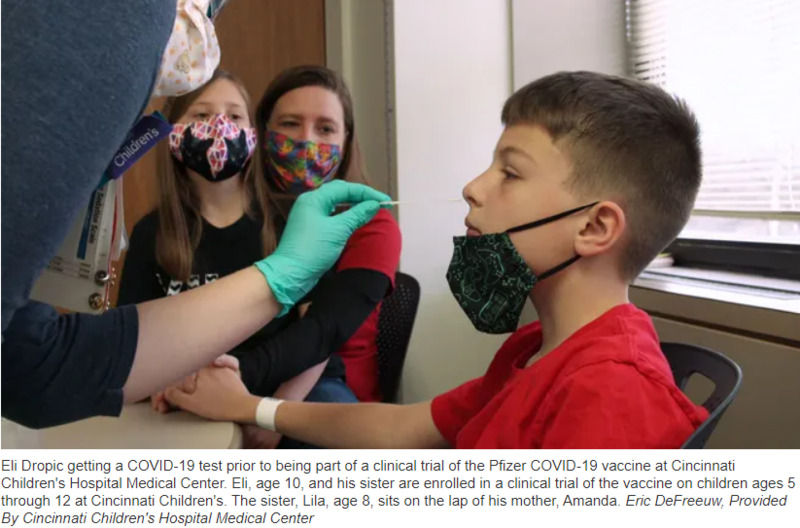 2021-04-13
2021-04-13How does the pandemic affect children?
This article speaks about the clinical trials that have begun in Cincinnati Children's Hospital Medical Center in hopes of getting a vaccine out for children as young as five years old. At the moment about 3,000 children have been on a waitlist to be involved in the trial. There are sites at which people are working to get dosage limits right for children ranging from 2-4 aswell. Many responses were collected by children on how they felt about being a part of the trial. Lila, a third-grader who is 8, was asked what was the best thing about participating in the vaccine trial, she replied, "knowing I might be able to not wear my mask anymore and knowing that the coronavirus vaccine is coming out." The effects the pandemic has on the children are visible as their hopes are to help the pandemic stop so that things go back to normal for them. -
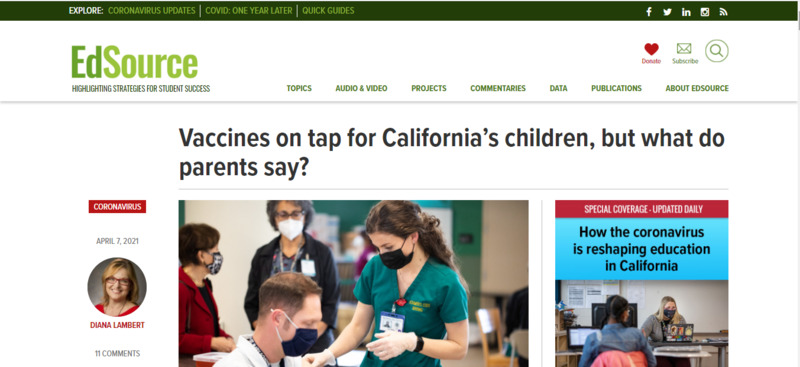 2021
2021Vaccine Eligibility Expanding to Adolescents, Californian Parents React to Schools Reopening
California is soon expanding their vaccine eligibility to 16 and older on April 15, 2021. The plans for expanding it even more aren't expected to be for sometime. However, the announcement from Pfizer-BioNTech stating that the vaccine is safe and effective for 12 and older does give some hope for a quicker time frame. The is a focus on giving children and adolescents back their youth. There are schools opening with hybrid instructions (online and on-site instruction), but there the on-site hours are always rotating students to minimize crowd interaction. The article goes on to include opinions from parents of adolescents, which emphasized the importance of getting everyone (school faculty and students alike) vaccinated. Everyone seems eager to get back to pre-pandemic life as soon as possible, so the eligibility expansion does receive as good news and gives the public hope. Naturally, however, it’s not all good news as people need to remain informed and cautious. The article reminds us that variants of the virus have the potential to harm younger children. Notably, it’s the B117 strain that’s been said by Dr. Michael Osterholm, director of the Center for Infectious Disease Research and Policy at the University of Minnesota, that can be “50% to 60% more contagious than other strains of Covid-19” from his observations of Minnesota schools. -
 2021-04-06
2021-04-06U.S. Vaccination Eligibility Expanding on April 19, 2021
With a goal of 200 million vaccine shots by the 100th day in office, President Biden announced that the deadline (May 1) for eligibility will move up to April 19. Actions to vaccinate the country are speeding up. This motion will open up eligibility to “90% of adults”. States such as New Jersey, South Dakota and Nebraska plan to expand that eligibility to 16 and older even sooner to the deadline. Naturally, part of the process is to market the vaccine to the general public, especially to the ones hesitant to get the vaccine. That funding is coming from the COVID-19 economic relief package ($1.9 trillion). -
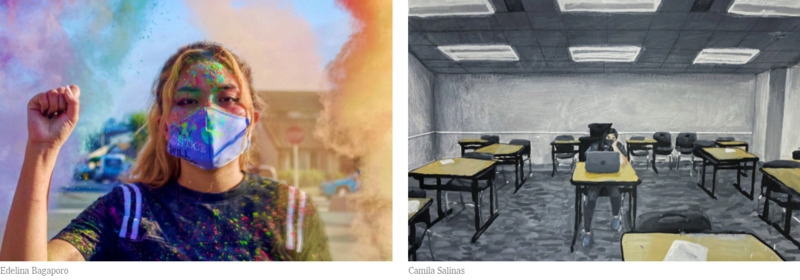 2021-04-08
2021-04-08How does the pandemic affect children?
This article titled "Coming of Age" is a great article that provides various art pieces from children all around the world. Who, through their art display the feelings they feel during the pandemic, certain stepping stones of their life that they were unable to celebrate fully, and even self-development that was limited. More can be said about the article by looking at the images provided and the unique descriptions below them. -
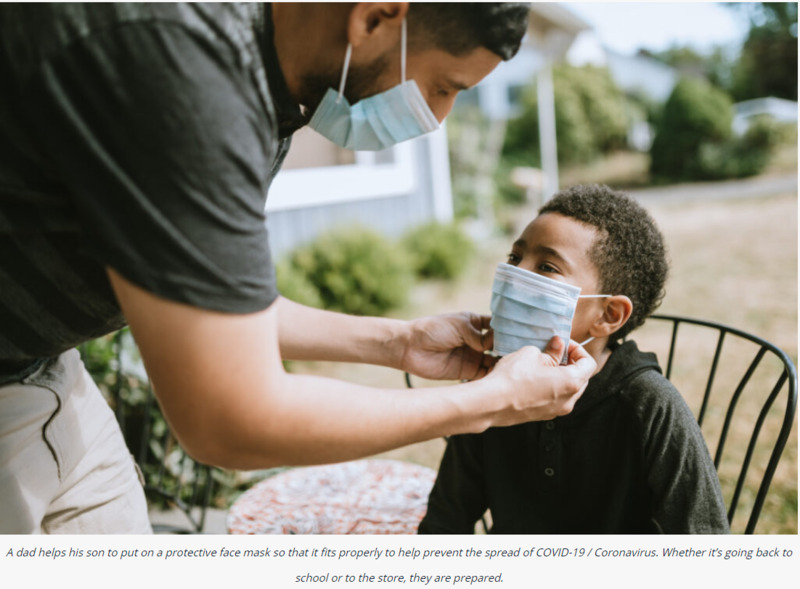 2021-04-08
2021-04-08How does the pandemic affect children?
This article speaks about obesity in children during the pandemic. With lots of parents work being closed as well as schools, parents struggle to provide healthy options to children and are stuck with buying cheaper option that is mostly filled with preservatives and high calories that is causing obesity rates to increase. Effects of diet during youth effects eating habits that a child developss as it grows. As weight plays a role mentally and physically in a person's health, the pandemic affects children in such away. -
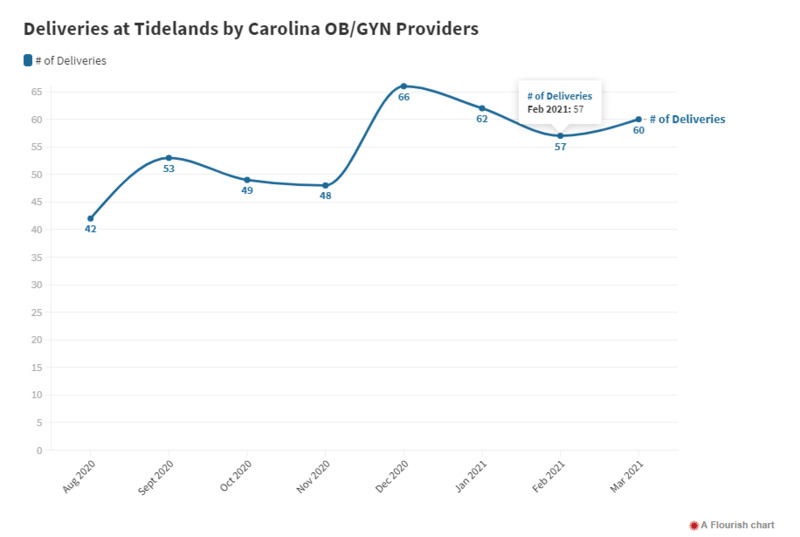 2021-04-08
2021-04-08How does the pandemic affect children?
This article speaks about birth rate spikes around the world during the pandemic. The chart provided shows birth increases. Many families are now welcoming children after 5-6 years. This is described as the next baby boom. The correlation this has with my research topic involves the idea that increased birthrates, and their effects on children at home along with the development of these children as they are born in the middle of the pandemic. -
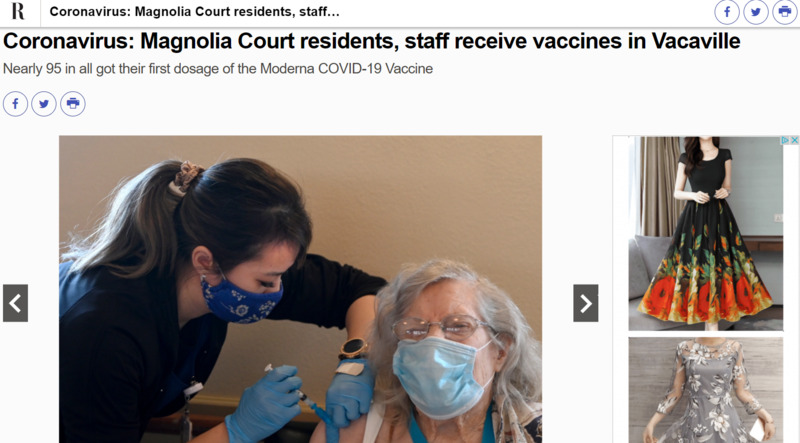 2021-01-15
2021-01-15My Grandma Made Front Page Again
My grandma Pauline Bell made the front page of our local paper again. This time, she was one of the first in the area to receive the vaccine. We were all so happy for her and what this might mean for all of us who miss her. -
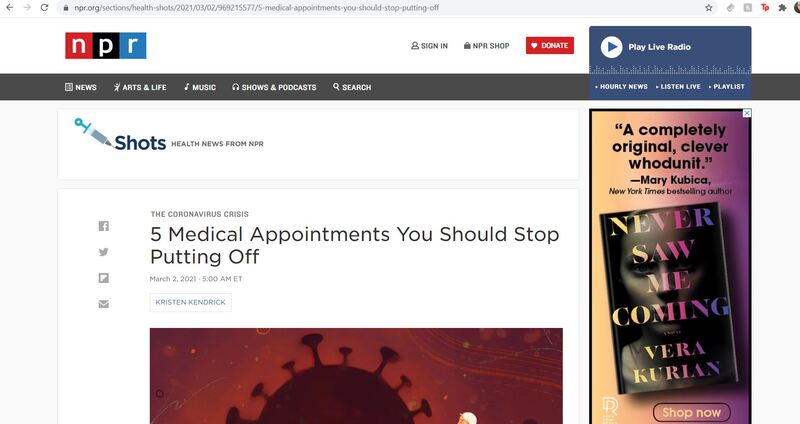 2021-04-04
2021-04-04Putting off Medical Appointments for fear of COVID
I myself did not see a doctor or make any appointments until August of 2020, roughly 5 months into the pandemic. I attended my well woman’s exam, something I get yearly. The article I have added here was written by a doctor. He talks about in the beginning of the pandemic, it was critical to only see the patients that needed to be seen, as there was still so much unknown. He goes on to talk about how the risks from postponing exams outweigh the risk of catching COVID-19. This is a big part of my research, the unintended consequences of the COVID-19 pandemic. "A woman is more likely to die from an advanced-stage breast cancer than she is from COVID-19," said Therese Bevers, a medical director at a MD Anderson Cancer Center. The doctor who wrote the article said he consulted with other doctors to create a list of appointments you should stop putting off. These are: cancer screenings, checkups for “new red-flag symptoms,” follow ups for chronic diseases, mental health management, and sexual health management. It is clear that these issues are important for human health upkeep, and they shouldn’t be avoided due to COVID-19 anymore. We have yet to see just how many health issues have been ignored during this pandemic.
